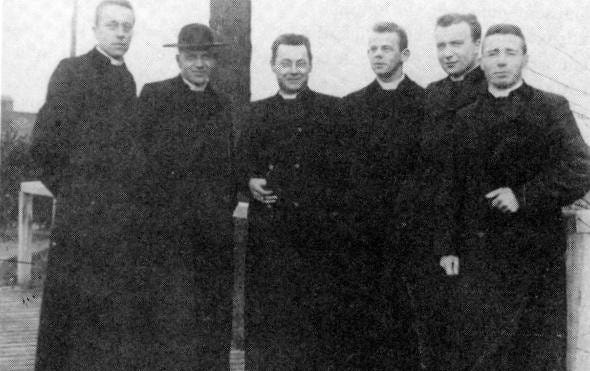Today is the 120th anniversary of the death of Joseph Cardijn’s father, Henry, which means it’s also the 120th anniversary of Cardijn’s consecration of his life to the working class.
Strangely enough, perhaps, we don’t know many details of the life of Henricus Hieronymys (Henry Jerome) Cardijn, who was born in 1850 and died at the age of 53 in 1903.
Fortunately, however, his son Joseph recorded a few of the essentials of the humble, hard-working life of his father:
According to the birth registry, I was born on 18 November 1882 in Chaussée de Haecht, Schaerbeek, where my parents were caretakers and my father a coach driver. Following my baptism in Saint Servais church on the 16 November, they sent me to stay with a nanny at Halle in my father’s region of origin as my mother was seriously ill.
Five or six years after my birth, my parents moved back to Halle where they initially established a small grocery that they were soon obliged to close for lack of customers in order to begin managing a small coal store which at first had only a small cart for supplying customers and then later a horse-drawn cart to load coal from the station or the boat.
My father worked hard and from a very early age I helped him to unload the coal and serve customers and as soon as I knew how to read and write to prepare invoices and orders since my father did not know how to read or write.
Nevertheless, Henry must have been a social-minded Catholic. Marguerite Fiévez and Jacques tell us that it was from his father that Cardijn first learned of Pope Leo XIII’s famous 1891 encylical on the situation of the working class, Rerum Novarum:
As a small boy, nine at the time, Joseph Cardijn had heard it talked of. His illiterate father had asked him to read it aloud to him.
Despite this, Henricus (or ‘Rikus as he was known) had little understanding of Joseph’s “thirst for knowledge.”
As Cardijn later wrote:
At home, I devoured books and newspaper to the great disgust of my father who feared for my frail health and understood nothing of my passion for reading
As Cardijn also often recalled, life was a constant financial struggle for the family. This eventually took a toll on his father’s health:
Following my Solemn Communion, the question arose of placing me as an apprentice and going to work. My father was exhausted and his small business was in decline. Then, one evening, no longer able to contain myself, I jumped out of bed, descended to the kitchen and told my astonished parents of my desire to become a priest for which my father and mother both sacrificed themselves.
Despite the burden that this would cause the family, Henricus immediately gave his consent to his son’s priestly ambition:
Fiévez and Meert tell the story this way:
One evening he could keep to himself no longer and while his brothers and sister were asleep, he got out of bed and came down to the kitchen. He stood in the doorway barefoot and in his nightshirt.
“Well, what are you up to there?” asked his father in surprise. “Are you sick? No? Then, my boy, off to bed !”
“I can’t sleep . . .”.
“A likely story . . .”.
“Father, let him speak,” cut in the wife, feeling there was something here that had to be faced.
Joseph was choked up but resolute: “I would like to be able to carry on at school. I want to be a priest and you have to study a lot for that. I want your permission not to go to work.”
His mother’s face turned white. Her intuition had not deceived her. His father spoke: “Woman, we have already worked hard. But if we, small folk as we are, could have the joy of giving our son to God, well, we’ll work on a bit more!”
“And you”, to the boy, “off to bed!”
Henceforth, we hear little of Henri Cardijn until the time of his death on 24 May 1903.
Once again Fiévez and Meert tell us the story:
Back in the seminary to finish his studies in philosophy, he was suddenly called home. Henri Cardijn was dying. He had laboured all his life; had worked to the end and was now dying prematurely.
With his emotional and passionate temperament, young Joseph was bowled over by this fresh shock.
As he knelt to receive his father’s last blessing, he felt drawn to respond to a new call from God, a call that was clear and decisive. In his innermost being he swore to consecrate his whole life as a priest to save the mass of the workers.
For more than sixty years he would live to the full that commitment in daily fidelity by the total gift of himself.
Cardijn never forgot the debt he owed to his father and he did indeed honour his commitment to the workers for the rest of his life.
In tomorrow’s reflection we’ll look at how his vow also inspired 500 bishops at the Second Vatican Council.
Author
Stefan Gigacz
Sources
Marguerite Fiévez and Jacques Meert, Cardijn, Chapter 1: Birth (Joseph Cardijn Digital Library)
Marguerite Fiévez and Jacques Meert, Cardijn, Chapter 2: Seminary (Joseph Cardijn Digital Library)
Joseph Cardijn, Background (Joseph Cardijn Digital Library)
Family Tree (Geneastar)
Family Tree (My Heritage)


